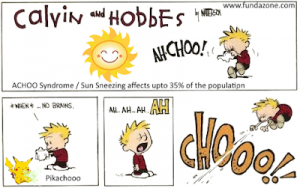Your nose starts to twitch just as you step out of a dark room and into the sun. The mild tingle inside the nasal cavity soon turns into an uncomfortable itch.
“ACHOO!”
What you just experienced is the Photic Sneeze Reflex, otherwise known as ACHOO (Autosomal Compelling Helio-Ophthalmic Outburst) syndrome or “sun sneezing”. It is estimated to occur in 18 to 35 percent of the population. The condition tends to be most intense after one has spent a considerable length of time in a dark environment. Yet, due to its seemingly harmless nature, there has been surprisingly scarce study on the subject.
In his Book of Problems, Aristotle was one of the first to ponder about this curious phenomenon in 350 BCE. He speculated it may have been due to the heat of the sun on the nose, which led to sweating inside the nose, prompting a sneeze to remove the moisture. Nearly 2000 years later, English philosopher Francis Bacon tested Aristotle’s idea by walking into the sun with his eyes closed. The sneeze was no longer there, despite the presence of the heat. He then hypothesized that the heat causes the eyes to water, which then seeps down to the nose, triggering a sneeze. Amusing as his idea may seem, it was considered plausible until our modern understanding of physiology made it clear that the rate of which our eyes water,and the speed of fluid travelling through tear ducts is much, much slower compared to how quickly the sneeze occurs.
Nowadays, most scientists agree that “cross wiring” in the brain are most likely behind the Photic Sneeze Reflex. It was first hypothesized in 1964 that the reflex was a cause by the nervous system, perhaps a confusion of nerve signals. The theory states that the trigeminal nerve, which triggers sneezes and is responsible for facial sensation and motor control, lies closely to the optic nerve, which would sense a sudden flood of light entering the retina. Some of the signal within the optic nerve is picked up by the trigeminal nerve, mistaken by the brain as irritation in the nose, leading to a sneeze. Further studies suggested a genetic basis for the symptoms, revealing that the trait is autosomal-dominant, meaning if one parent exhibits the trait, about half of his or her children will too. But as of now the genetic culprit has yet to be identified.

The Sun Sneeze Gene by Veritasium (Youtube)
Are there any risks? Although sneezing itself is merely an annoyance and usually does not present any risk of injury, concerns have been raised regarding the combined threat of sudden increase in light intensity, an induced sneeze, and subsequent eyelid closure, which could be dangerous for some occupations, such as vehicle operation at high speeds.
Despite the phenomenon still being poorly understood, scientists are taking an increasing interest in trying to solve the mystery. Nonetheless, if you are one of the many of us affected, perhaps consider shielding your eyes with hats or sunglasses more often.
James Wang

